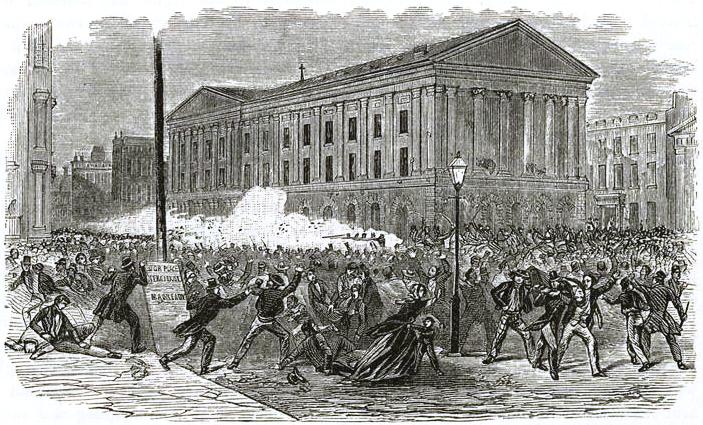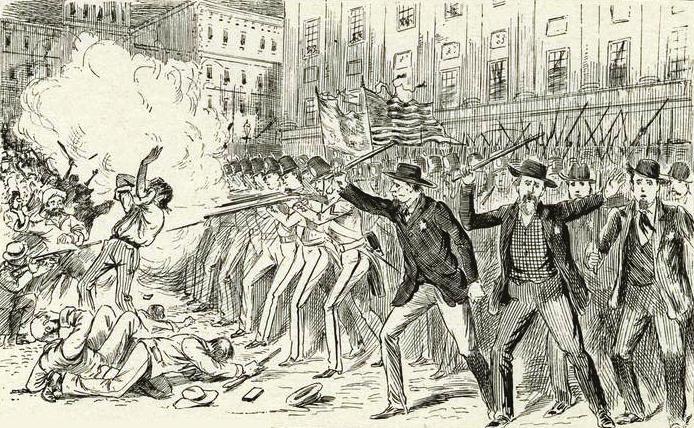Aug 5, 2019

The second-bloodiest riot in the history of New York was touched off by a dispute between two Shakespearean actors. Their supporters started a brawl that killed as many as 30 people and changed the institution of theater in American society. In this week's episode of the Futility Closet podcast we'll tell the story of the Astor Place riot, "one of the strangest episodes in dramatic history."
We'll also fertilize a forest and puzzle over some left-handed light bulbs.
Intro:
In 1968, mathematician Dietrich Braess found that installing a traffic shortcut can actually lengthen the average journey.
What key is "Lucy in the Sky With Diamonds" written in?
Sources for our feature on the Astor Place riot:
Nigel Cliff, The Shakespeare Riots: Revenge, Drama, and Death in Nineteenth-Century America, 2007.
Richard Moody, The Astor Place Riot, 1958.
Lawrence Barrett, Edwin Forrest, 1881.
Joel Tyler Headley, Pen and Pencil Sketches of the Great Riots, 1873.
H.M. Ranney, Account of the Terrific and Fatal Riot at the New-York Astor Place Opera House, 1849.
Leo Hershkowitz, "An Anatomy of a Riot: Astor Place Opera House, 1849," New York History 87:3 (Summer 2006), 277-311.
Bill Kauffman, "New York's Opera House Brawl," American Enterprise 13:4 (June 2002), 51.
M. Alison Kibler, "'Freedom of the Theatre' and 'Practical Censorship': Two Theater Riots in the Early Twentieth Century," OAH Magazine of History 24:2 (April 2010), 15-19.
Edgar Scott, "Edwin Forrest, First Star of the American Stage," Pennsylvania Magazine of History and Biography 84 (1960), 495-497.
Adam I.P. Smith, "The Politics of Theatrical Reform in Victorian America," American Nineteenth Century History 13:3, 321-346.
Daniel J. Walkowitz, "'The Gangs of New York': The Mean Streets in History," History Workshop Journal 56 (Autumn 2003), 204-209.
Gretchen Sween, "Rituals, Riots, Rules, and Rights: The Astor Place Theater Riot of 1849 and the Evolving Limits of Free Speech," Texas Law Review 81:2 (December 2002), 679-713.
Michael J. Collins, "'The Rule of Men Entirely Great': Republicanism, Ritual, and Richelieu in Melville's 'The Two Temples,'" Comparative American Studies 10:4 (December 2012), 304-317.
Loren Kruger, "Our Theater? Stages in an American Cultural History," American Literary History 8:4 (Winter 1996), 699-714.
Dennis Berthold, "Class Acts: The Astor Place Riots and Melville's 'The Two Temples,'" American Literature 71:3 (September 1999), 429-461.
Cary M. Mazer, "Shakespearean Scraps," American Literary History 21:2 (Summer 2009), 316-323.
Barbara Foley, "From Wall Street to Astor Place: Historicizing Melville's 'Bartleby,'" American Literature 72:1 (March 2000), 87-116.
Neil Smith, "Imperial Errantry," Geographical Review 102:4 (October 2012), 553-555.
Betsy Golden Kellem, "When New York City Rioted Over Hamlet Being Too British," Smithsonian.com, July 19, 2017.
Amanda Foreman, "A Night at the Theater Often Used to Be a Riot," Wall Street Journal, March 20, 2015.
Scott McCabe, "At Least 22 Killed in Astor Place Riots," [Washington, D.C.] Examiner, May 10, 2011.
Timothy J. Gilfoyle, "A Theatrical Rivalry That Sparked a Riot," Chicago Tribune, April 22, 2007, 14.11.
Paul Lieberman, "The Original Star; On His 200th Birthday, America's First 'Celebrity' Actor, Edwin Forrest, Still Has Fans," Los Angeles Times, March 21, 2006, E.1.
Michael Grunwald, "Shakespeare in Hate; 150 Years Ago, 23 People Died In a Riot Over 'Macbeth,'" Washington Post, March 28, 1999, G01.
Mel Gussow, "Richard A. Moody, 84, American-Theater Expert," New York Times, April 4, 1996.
Frank Rich, "War of Hams Where the Stage Is All," New York Times, Jan. 17, 1992.
"Theater: When 'Macbeth' Shook the World of Astor Place," New York Times, Jan. 12, 1992.
"The Biggest Publicity Coup in the History of the Stage," New York Tribune, May 4, 1913, 4.
"Death of an Aged Actress," New York Times, March 17, 1880.
J. Brander Matthews, "W.C. Macready," Frank Leslie's Popular Monthly 10 (1880), 97-101.
"The Astor Place Riots," New York Times, April 11, 1875.
"An Old Story Retold; The Astor Place Riot -- Reminiscences of Macready," New York Times, April 3, 1875.
"Dreadful Riot and Bloodshed in New York," British Colonist, May 23, 1849.
"Remembering New York City's Opera Riots," Weekend Edition Saturday, National Public Radio, May 13, 2006.

Listener mail:
M. Ben-David, T.A. Hanley, and D.M. Schell, "Fertilization of Terrestrial Vegetation by Spawning Pacific Salmon: The Role of Flooding and Predator Activity," OIKOS 83 (1998), 47-55.
James M. Helfield and Robert J. Naiman, "Effects of Salmon-Derived Nitrogen on Riparian Forest Growth and Implications for Stream Productivity," Ecology 82:9 (2001), 2403-2409.
Wikipedia, "Salmon" (accessed July 13, 2019).
Paul Clements, "An Irishman's Diary on Football Legend Danny Blanchflower," Irish Times, April 11, 2015.
"Danny Blanchflower," Big Red Book (accessed July 13, 2019).
Alex Finnis, "Jersey Is Being Terrorised by 100-Strong Gangs of Feral Chickens Waking Up Locals and Chasing Joggers," i, June 18, 2019.
"Jersey Residents Annoyed by Feral Chickens," BBC, July 6, 2018.
"Channel Islands Residents Cry Foul Over Feral Chickens," Morning Edition, National Public Radio, June 28, 2019.
Daniel Avery, "Gang of 100 Feral Chickens Terrorizing Town," Newsweek, July 2, 2019.
Will Stewart, "Russian Hermit Cut Off From World Refuses to Leave Despite Rocket Debris Fears," Mirror, June 21, 2019.
"Siberian Hermit, 75, Who 'Lives in 18th Century' Refuses to Be Moved by Space Age," Siberian Times, June 21, 2019.
A bridge of Königsberg (now Kaliningrad), from listener Alex Baumans:

This week's lateral thinking puzzle was devised by Greg. Here are two corroborating links (warning -- these spoil the puzzle).
You can listen using the player above, download this episode directly, or subscribe on Google Podcasts, on Apple Podcasts, or via the RSS feed at https://futilitycloset.libsyn.com/rss.
Please consider becoming a patron of Futility Closet -- you can choose the amount you want to pledge, and we've set up some rewards to help thank you for your support. You can also make a one-time donation on the Support Us page of the Futility Closet website.
Many thanks to Doug Ross for the music in this episode.
If you have any questions or comments you can reach us at podcast@futilitycloset.com. Thanks for listening!



